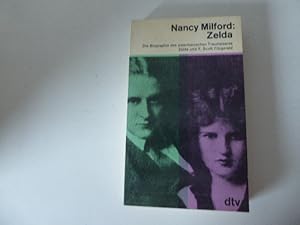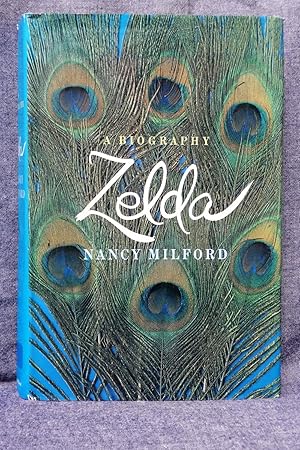Nancy Winston Milford (2 results)
Product Type
- All Product Types
- Books (2)
- Magazines & Periodicals
- Comics
- Sheet Music
- Art, Prints & Posters
- Photographs
- Maps
-
Manuscripts &
Paper Collectibles
Condition
- All Conditions
- New
- Used
Binding
Collectible Attributes
- First Edition (1)
- Signed
- Dust Jacket (1)
- Seller-Supplied Images
- Not Printed On Demand
Seller Location
Seller Rating
-
Zelda. Die Biographie des amerikanischen Traumpaares Zelda und F. Scott Fitzgerald. TB
Published by Deutscher Taschenbuch Verlag dtv, München, 1980
ISBN 10: 3423015322ISBN 13: 9783423015325
Seller: Deichkieker Bücherkiste, Lemwerder, NS, Germany
Book
Softcover. Condition: SEHR GUT. 220 g. Min. gebräunt. deutsch 312 pages.
-
Zelda
Published by Harper & Row, Publishers, Inc., New York, 1970
Seller: Past Pages, Oshawa, ON, Canada
First Edition
Hard Cover. Condition: Fair. Dust Jacket Condition: Good. First Edition 7th Printing. BOOK: Previous Owner Markings/Ex-Library; Repaired; Front Free Endpaper Missing; Front Fixed Endpaper, Rear Endpapers Show Residue From Removal of Pocket, Jacket Cover; Corners, Spine Bumped; Heavy Shelf Rub to Boards; Spine Heavily Cocked; Heavy Yellowing Due to Age. DUST JACKET: Previous Owner Markings (Price Clipped); Lightly Creased; Lightly Chipped; Slight Yellowing Due to Age; Spine Moderately Faded and Discoloured Due to Sun Exposure and Removal of Sticker; In Archival Quality Jacket Cover. SUB-TITLE: A Biography. BOOK NUMBER: 0670. CONTENTS: Acknowledgments; Prologue; PART ONE: Southern Girl; PART TWO: The Twenties; PART THREE: Breaking Down; PART FOUR: Going Home; Notes and Sources; Index; Illustrations follow page 174. SYNOPSIS: There was a curious streak of recklessness in Zelda Sayre when she was a child. As she grew up, her escapades became the scandal of her hometown of Montgomery, Alabama. But she was a beauty and her father was a respected judge. Witty, indulged, capricious, she thoroughly enjoyed exercising the prerogatives of a belle. When she married F. Scott Fitzgerald in 1920 after a storm two-year courtship, her life seemed the natural extension of her Montgomery existence, played on a larger stage--New York, Paris, the Riviera. She and Scott moved in a golden aura of excitement, romance and promise. The epitome of the Jazz Age, they rode the crest of the era to its collapse, and their own. Scott's side of their romantic and painful story has been explored. It is Zelda who has remained a shadowy figure. In this biography it becomes increasingly clear how deeply dependent on each other the Fitzgeralds were, and to what an extraordinary degree their dreams were matching ones. Even in their worst years, each could still draw on a reservoir of feeling in the other. In part their tragedy lay in their being too close; at their worst they fought for the same ground. Not the least of the fascinations of this book is the insight it offers into Scott Fitzgerald as a husband. His inability to provide the stability Zelda needed was matched only by his relentless effort to do so. Yet, when he felt she was encroaching on his literary territory, he resented it; and, as his own career deteriorated, he felt an increasing need to dominate her. If, as he wrote, he married the heroine of his stories, it was part of Zelda's predicament that she accepted the role and was unable to escape it. She turned to ballet, to writing and to painting. She was good--it was remarkable, in fact, just how good she was--but not good enough. A decade, almost to the day, after her marriage to Scott she suffered her first mental breakdown. The rest of her life was spent in and out of clinics. Save Me the Waltz, her first novel, and several short stories were completed while she was in a mental hospital; it was a bitter stroke of irony that she realized some of her own true potential only as she fought against insanity. Zelda's letters to Scott during these periods are among the most poignant and stunning documents in American biography. They were thought to be lost, but Nancy Milford found them and uses them to illuminate the agony of this lonely woman reaching toward her husband, her "King of the Roses." In addition to this material, a play and an unfinished novel of Zelda's called Caesar's Things, Mrs. Milford has been able to draw on interviews with people who knew Zelda--the Gerald Murphys, John Dos Passos, the late Dorothy Parker and Carl Van Vechten--as well as on hundreds of previously unpublished letters from both Fitzgeralds. The portrait that emerges is that of a complicated and unhappy person, a match for her husband but too much for herself, who could nevertheless write to her daughter near the end of her life: "I always feel that Daddy was the key-note and prophet of his generation. I wish that I had been able to do better one thing and [had] not [been] so given to running into cul-de-sacs with so many." Nancy Winston Milford was bo. Ex-Library.



